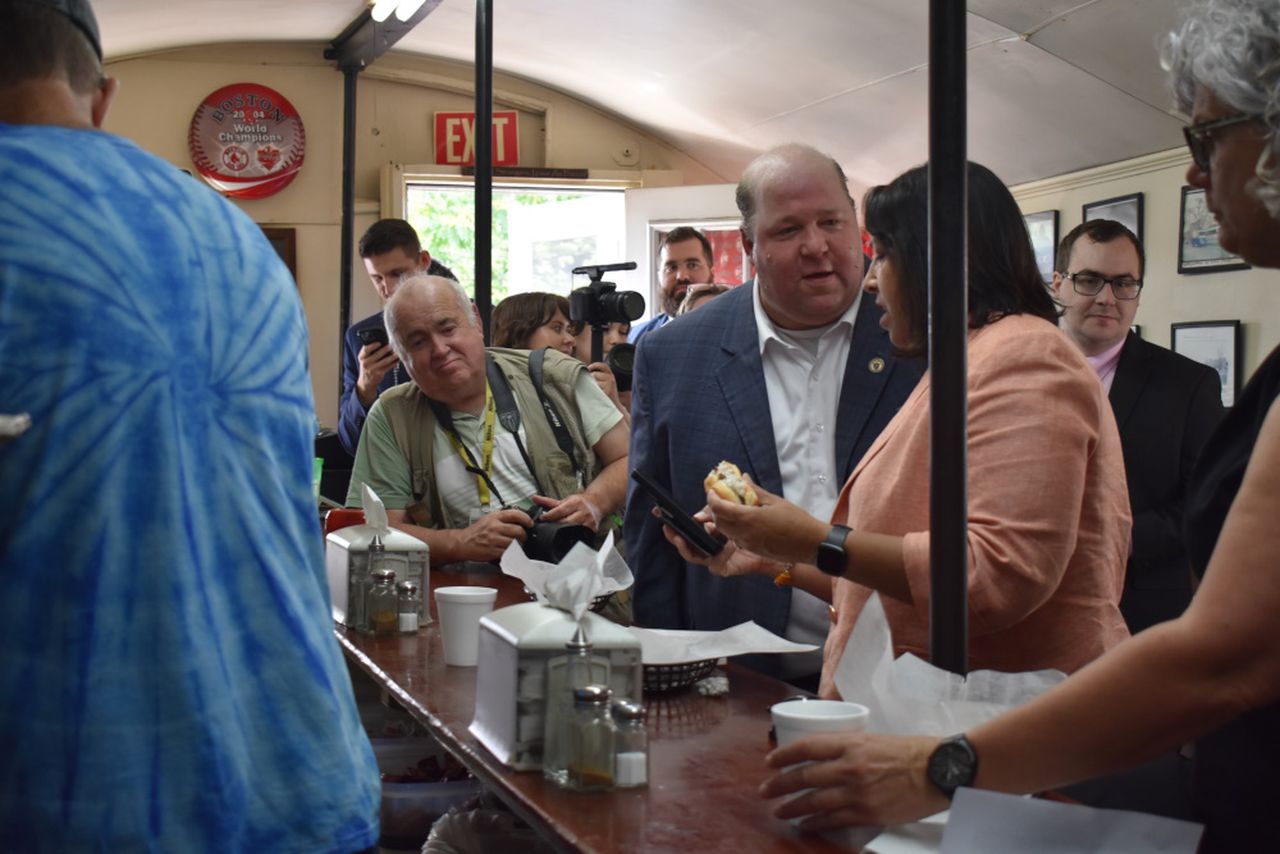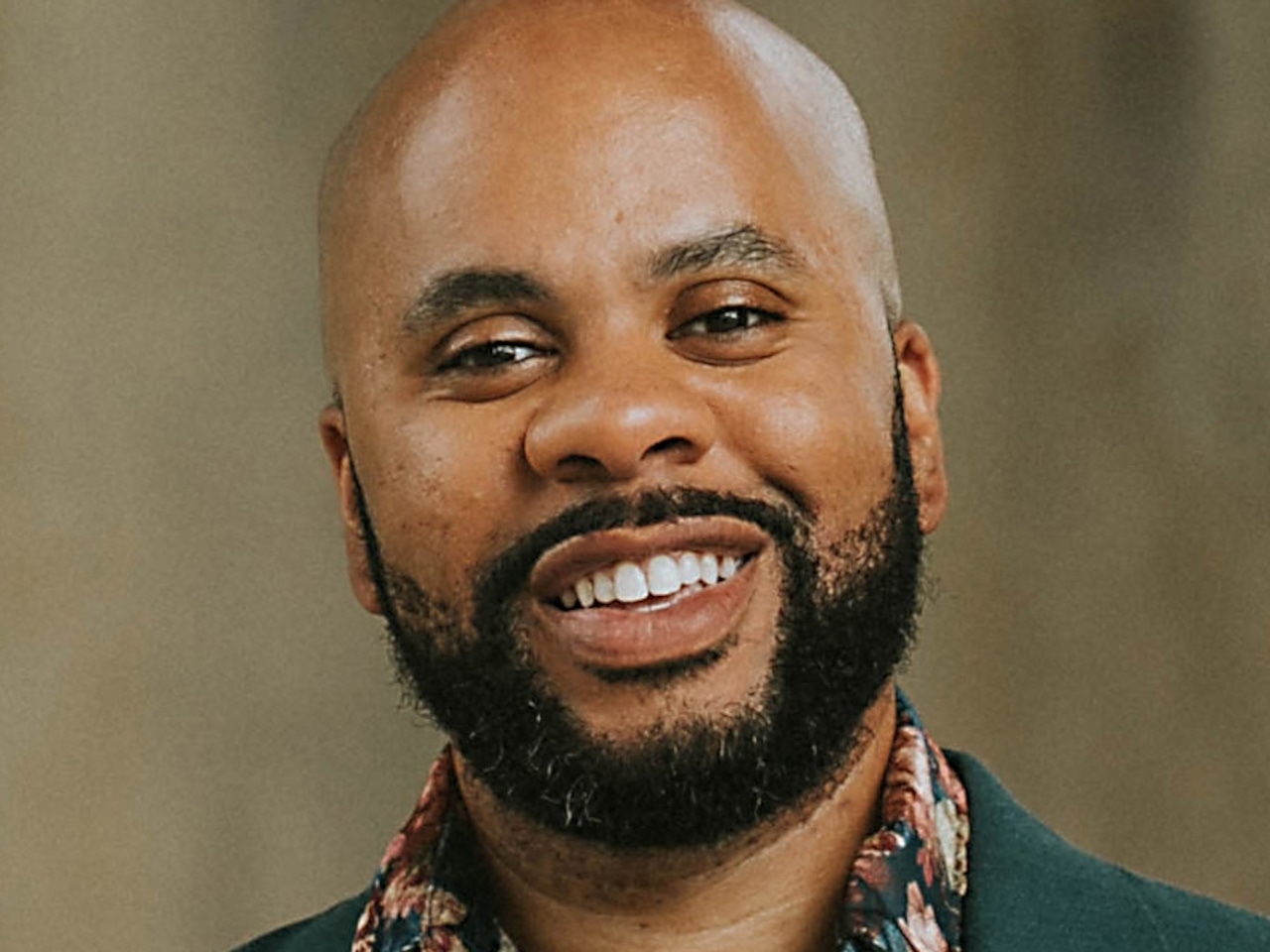
It was still a bit shy of 11 a.m., but Lt. Gov. Kim Driscoll had spent the last 45 minutes walking through downtown Attleboro and talking about the nitty-gritty of economic development with the city’s mayor, development team and legislative delegation. There was only one thing left to do.
“Let’s do it,” Driscoll said. “Let’s go get a hot weenie.”
Led by Mayor Cathleen DeSimone, Driscoll, Sen. Paul Feeney, and Reps. Jim Hawkins and Adam Scanlon piled into Tex Barry’s Coney Island Diner for hot wieners late Thursday morning. The southeastern Mass. and Rhode Island specialty is a hot dog with yellow mustard and onions topped with chili sauce. There was even a “hot dog toast to Attleboro.”
“Oh my gosh, Tex! That was a great hot dog,” Driscoll said afterwards. “It’s so authentic to be able to walk into a place like that, that you know has had decades of experience in a community and you still get that same nostalgia. It was a terrific hot dog and great community building for sure.”
The hot wieners were a hit, but they weren’t the main reason that the lieutenant governor traveled to Attleboro. She was in the Jewelry City as part of a swing through the region to talk about local economic development, something that Driscoll oversaw in a similarly-sized Gateway City during her 17 years as mayor of Salem.
During the 45-minute walking tour of a section of downtown Attleboro that city leaders are eager to develop in a way that ties into the commuter rail station and the city’s green spaces, Driscoll said she was looking for “opportunities to partner.”
“Where can state resources and state policy shift and help our local leaders? We know when we have strong communities, we have a strong commonwealth. So part of my job and certainly Governor Healey’s job in partnership is making sure we’re doing all that we can to support our cities,” she said.
Some of those opportunities presented themselves pretty clearly. At one point, a city official explained to Driscoll that the storefronts on the ground level of two apartment buildings were either vacant or occupied by offices for dentists and physical therapists because developers often don’t want to build out the storefronts to the point that a local small business could afford to operate there.
“One of the programs we’re looking at — I was just talking about it this morning on the way down — is ways the state might be able to help support the capital costs to build out the first floor commercial space,” Driscoll replied. “Because when you really want to create that mixed-use activity, but the small coffee shop — especially independently-owned, non-chains — can’t afford the capital costs. But once you build it out, then you see the success of your business model, whatever it might be, to get that type of activity. We all love the 15-minute neighborhood concept. But the housing goes quickly and then the commercial development becomes a drag on it.”
he lieutenant governor also made clear to DeSimone and other city officials that she could be helpful if the city runs into any issues that involve state departments or agencies. While hearing about the vision for a vacant area of land next to the city’s downtown commuter rail station and that the city is talking to the Department of Transportation about swapping parcels, Driscoll asked if she could help.
“Do I need to unstick anything or is it moving forward?” she asked.
She also made special note of the fact that a project Attleboro officials highlighted was the beneficiary of the Housing Development Incentive Program, which offers tax credits aimed at boosting production of housing units especially in smaller cities.
“Legislators, did you hear that? That’s an HDIP project,” she said after turning towards Hawkins, Scanlon and Feeney.
Gov. Maura Healey and the Senate each sought to increase HDIP credits in their tax relief bills and the House this year approved a supplemental budget amendment expanding the program. Despite widespread agreement, the change in housing policy is not yet law. The HDIP expansion was not part of the supplemental budget that Healey signed Tuesday, and remains on the table as part of the private conference committee negotiations around tax relief.
“We’re glad to have a budget passed. But a key piece of of the work ahead is not just having the investments, but also having the relief to keep Massachusetts affordable, equitable and more competitive,” Driscoll said. “So that’s on the agenda for the fall. We’ll be working with our legislative leaders to try and get that passed as soon as possible.”
The fall timeline for action on tax relief, which state lawmakers first promised more than a year ago, jibes with the outlook that Senate President Pro Tempore Will Brownsberger gave in a post about the state budget resolution earlier this week.
“I am hopeful that the differences will be resolved in the Fall and we will get this done before Thanksgiving,” he said.
Driscoll’s swing through Attleboro was the first of three economic development events on her schedule Thursday. She headed next to Fall River, where she planned to tour Battleship Cove with Mayor Paul Coogan, Sen. Michael Rodrigues, and Reps. Paul Schmid and Alan Silvia. After that, she planned to check out the Zeiterion Performing Arts Center in New Bedford with Mayor Jon Mitchell and Rep. Antonio Cabral. Driscoll’s day is slated to wrap up in New Bedford with the opening ceremony for the Feast of the Blessed Sacrament.






